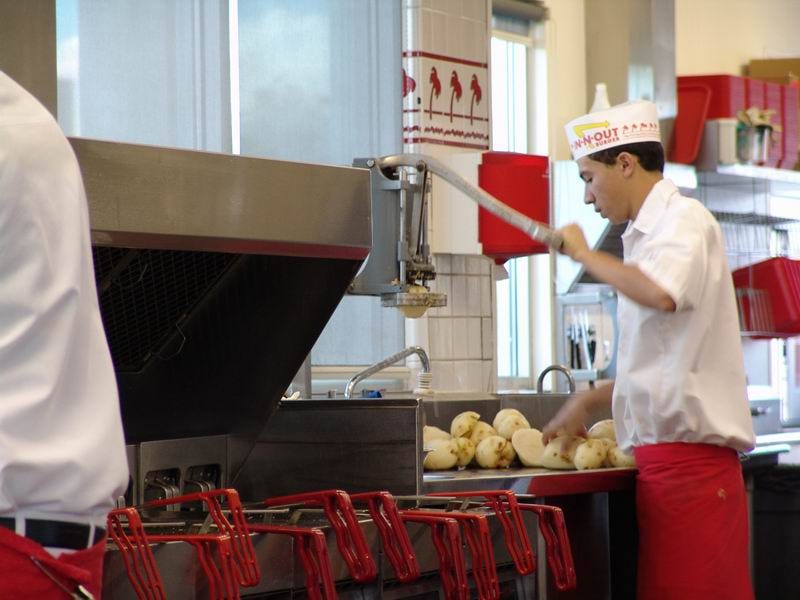
How the “Worst” Jobs Can Make Us All Better People
I was at a sandwich provider the other day — a well-known national chain whose employees are known as “sandwich artists”. I stood in line, holding my 2 year-old daughter, waiting patiently for my turn to tell the artist what kinds of sandwiches I wanted and exactly how to prepare them.
The woman in front of me was already taking part in that very process. She had some very specific requests. She needed (not wanted — a distinction that she made painfully clear) lettuce, tomatoes, pickles, and olives on one half of the sandwich, but not the other. What really seemed to matter was that the pickles could not touch the other half of the sandwich — which had to be kept intact as a foot-long for some reason.
There were a few more ludicrous requests, but you get the picture. At a few points during the truly ridiculous barrage of requests — when something was not done enough, or overdone — the woman was audibly and visibly frustrated. Her tone became aggressive, and her treatment of the sandwich artist became worse. Meanwhile, a line of people built up behind her as the lunch rush began.
Among the thoughts that crowded into my mind, one in particular stuck: I don’t think this woman has ever worked in food service before. That prompted me to think wouldn’t it be beneficial to nearly everyone if every person entering the working world had to work a food service job at some point in their life?
I think that the answer is clearly yes. I can think of five main reasons why. I’m sure there are more.
You learn to let others be right
We’ve grown enough as people to recognize that no, the customer is not always right. But, often times, acting as if they are is the best way to defuse an otherwise tense situation. This skill translates directly to pretty much any business you might enter. From the world of tech startups to established global conglomerates, difficult people abound. Dealing with them elegantly and with dignity is an art that will serve you well.
You gain exposure to most kinds of people
People from all walks of life and all types of background dine out or pick up fast food. Working in food service will — unless you’re exclusively working as a server at Spago — expose you to a wide range of characters. Not only will their ethnicity, religions, and socioeconomic statuses vary, bu their idiosyncrasies, preferences, and weird habits will too.
Having to cater to all of those preferences as part of your job becomes a great crash course in how to be agile and agreeable to a wide range of people. It should be no mystery as to how that will help you in any given career.
You learn to be out of control and bombarded by requests — and make it work
Heaps of articles have been written about how overwhelmed knowledge workers have become. There’s email, meetings, other messages, and so on. All of them can be a tremendous time-suck because they bombard you with questions, demands, FYIs, and other things to make you feel out of control of both your time and attention.
Well, lack of control, and time and attention theft is all in a day’s work in food service. Priorities are shuffled, agendas are torn up and re-written. Metrics are adjusted. The only constant is change, and often very quick change. Developing a mindset that can work and be productive in that kind of environment is something pretty much any employer would see as a strength.
You learn to serve, and be motivated to serve
Nowadays, everyone wants to be a leader, right? Maybe not everyone, but surely everyone who calls him or herself an entrepreneur does, right? There is a school of thought which believes that great leadership is based in being a truly effective servant — meaning you make sure that your people have what they need in order to be productive and effective.
It just so happens that food service work involves finding out what the customer would really like, and getting it for them. Sometimes — when done really well — this can take the shape of getting customers something before they even realize the want it. What a neat trick for a leader to have — being able to anticipate and deliver what his or her people need.
Most importantly, you learn to respect food service workers.
I have seen a lot of people be very rude to food service workers, mostly with little reason for it, other than just not getting exactly what they wanted. I will give those rude people a little slack because perhaps they assume that like themselves, food service employees are compensated well, go through rigorous training, and have managers that really work to help them develop and flourish. However, if they had worked in food service at some point, they’d be able to look back and realize that is by and large false.
Sure, there are places to get a burger where there is a great culture, good training, benefits, and a healthy employee environment. But there are a lot of companies that are just trying to stay profitable, and whatever bodies can fill the positions to make that happen are the ones they’ll throw a little bit of money at.
So, parents of children who you are hoping will go to the Ivy League or found their own unicorn startup, rather than using your connections to get them an internship at 16, toss them into the pit that is your local fast food joint for a year. If they really dig in for that year, they’ll learn some things — things that will make them better at whatever career they choose, but also better people. And isn’t that what we’re all after anyway?
